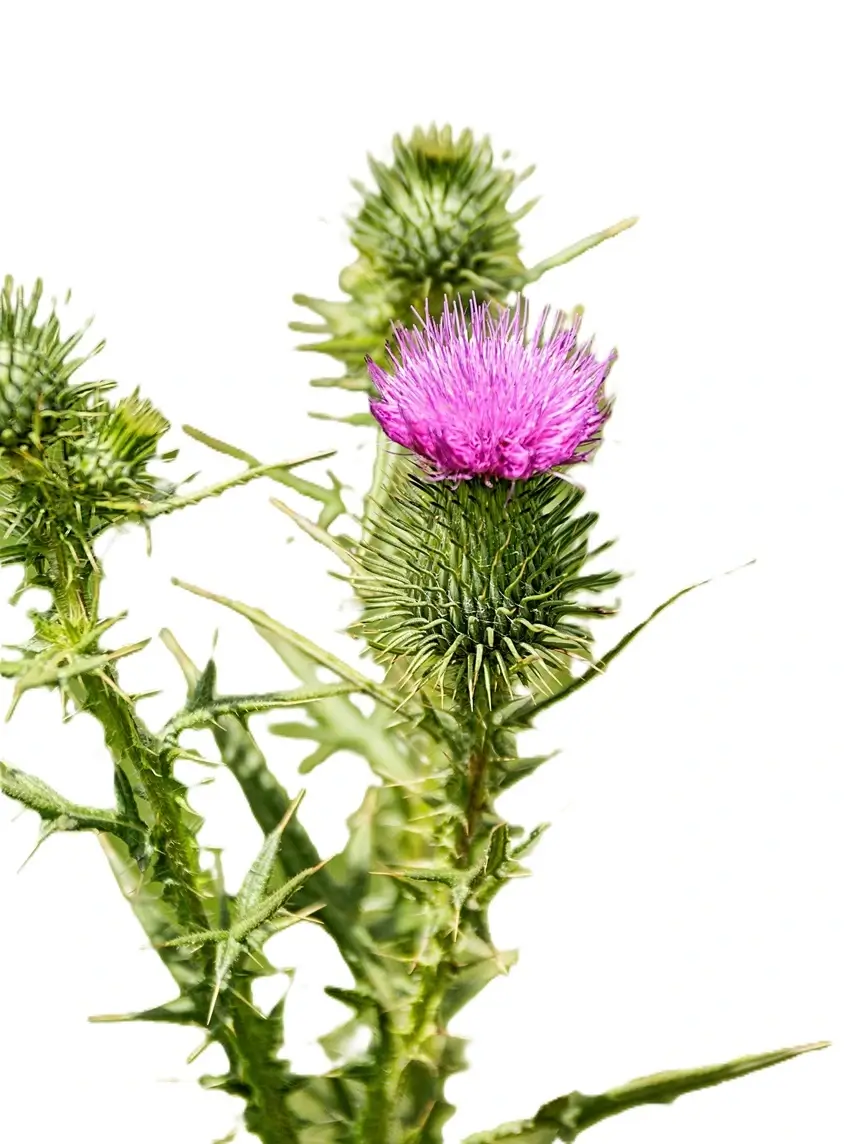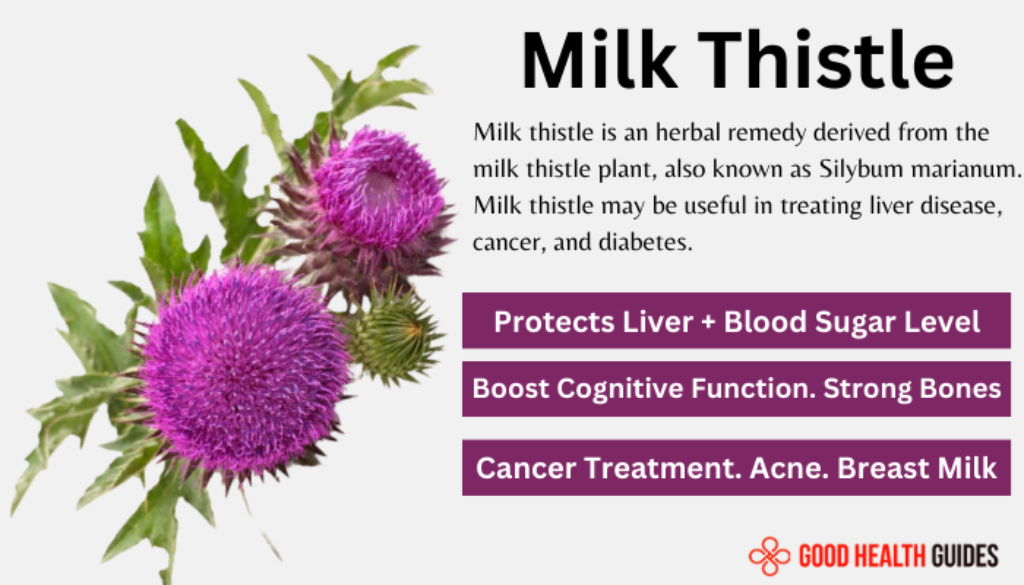Milk Thistle: Nature’s Gift for Liver Health and Beyond
Milk Thistle by Good Health Guides
Milk thistle, a unassuming yet powerful herb, has been revered for centuries as a natural remedy with a multitude of potential health benefits.
This purple-flowered plant, native to the Mediterranean region, has carved a niche for itself in the world of complementary and alternative medicine, capturing the attention of researchers and health enthusiasts alike.
In this comprehensive exploration, we’ll delve into the intricacies of milk thistle, unraveling its origins, examining its potential therapeutic properties, and providing practical guidance on its safe and effective use.
What Is Milk Thistle?
Milk thistle, scientifically known as Silybum Marianum, is a thorny plant belonging to the Asteraceae family, a group that includes familiar plants like sunflowers and daisies.
Its distinctive appearance is characterized by large, prickly leaves adorned with milky-white veins, lending the plant its evocative name. However, the true treasure lies within its seeds, which house a group of flavonoid compounds collectively referred to as silymarin.
Silymarin, the active ingredient responsible for milk thistle’s therapeutic potential, is a powerful antioxidant and has been the subject of extensive scientific research.
It is believed to be the primary driver behind the plant’s purported benefits, particularly in the realm of liver health and protection.
Health Benefits of Milk Thistle
Milk thistle has garnered significant attention due to its numerous potential health benefits, many of which stem from the remarkable properties of its active compound, silymarin. Here are some of the most well-known advantages associated with this powerful herb:
- Liver Protection and Regeneration: One of the most widely recognized benefits of milk thistle is its ability to protect and support liver health. Silymarin has been shown to possess potent hepatoprotective properties, shielding liver cells from damage caused by toxins, such as alcohol, certain medications, and environmental pollutants. Additionally, research suggests that milk thistle may promote the regeneration of liver cells, making it a potential ally in the treatment of liver diseases like cirrhosis and hepatitis.
- Antioxidant Properties: Silymarin is a potent antioxidant, capable of neutralizing harmful free radicals that can contribute to oxidative stress and cellular damage. By combating oxidative stress, milk thistle may play a role in preventing or slowing the progression of certain chronic diseases, such as cancer, diabetes, and heart disease.
- Blood Sugar Regulation: Emerging research suggests that milk thistle may have beneficial effects on blood sugar regulation, making it a potential ally in the management of diabetes. Some studies have indicated that milk thistle supplements may improve insulin sensitivity and help regulate blood sugar levels, although more research is needed to fully understand its mechanisms and efficacy.
- Promoting Breast Milk Production: Historically, milk thistle has been used by nursing mothers to promote breast milk production. While the scientific evidence is limited, some women report positive effects on milk supply when taking milk thistle supplements. This traditional use may be attributed to the plant’s potential influence on hormonal pathways involved in lactation.
- Anti-inflammatory Properties: Silymarin has been found to possess anti-inflammatory properties, which may contribute to its potential therapeutic effects in various inflammatory conditions. By reducing inflammation, milk thistle may aid in the management of diseases like arthritis, inflammatory bowel diseases, and certain types of cancer.
Side Effects of Milk Thistle
While milk thistle is generally considered safe when taken in recommended doses, it’s important to be aware of potential side effects, as is the case with any supplement or medication. Some of the possible side effects associated with milk thistle include:
- Gastrointestinal Discomfort: Some individuals may experience mild gastrointestinal symptoms, such as bloating, gas, or loose stools, when taking milk thistle supplements. These side effects are typically mild and may subside with continued use or dosage adjustment.
- Allergic Reactions: Individuals with allergies to plants in the Asteraceae family (e.g., ragweed, chrysanthemums) may be at a higher risk of developing an allergic reaction to milk thistle. Symptoms of an allergic reaction may include rash, itching, swelling, or difficulty breathing.

- Interactions with Medications: Milk thistle may interact with certain medications, particularly those metabolized by the liver enzymes CYP2C9 and CYP3A4. It’s crucial to consult with a healthcare professional before taking milk thistle supplements if you are on any prescription or over-the-counter medications to ensure safe and effective use.
Milk Thistle: Precautions
While milk thistle is generally considered safe for most individuals, there are certain groups who should exercise caution or avoid its use altogether:
- Pregnancy and Breastfeeding: There is limited research on the safety of milk thistle during pregnancy and breastfeeding. While some traditional use suggests potential benefits for lactation, it’s advisable to consult with a healthcare professional before taking milk thistle supplements during these times to weigh the potential risks and benefits.
- Individuals with Hormone-Sensitive Conditions: Milk thistle may have estrogenic properties, which could potentially affect individuals with hormone-sensitive conditions, such as breast cancer, endometriosis, or uterine fibroids. Those with these conditions should consult with their healthcare provider before using milk thistle supplements.
- Individuals with Diabetes: While milk thistle may have potential benefits for blood sugar regulation, it’s important for individuals with diabetes to monitor their blood sugar levels closely and consult with a healthcare professional, as milk thistle may interact with certain diabetes medications and affect insulin sensitivity.
- Individuals with Liver Disease: While milk thistle is often recommended for liver health, it’s important for individuals with severe liver disease or liver failure to exercise caution and consult with their healthcare provider before taking milk thistle supplements, as the potential interactions and effects may differ in these cases.
How to Take Milk Thistle Supplements
Milk thistle supplements are widely available in various forms, including capsules, tablets, tinctures, and powders. When taking milk thistle supplements, it’s essential to follow the manufacturer’s recommended dosage and consult with a healthcare professional, especially if you have any underlying health conditions or are taking other medications.
Typical dosage recommendations for milk thistle supplements range from 150 to 300 milligrams of silymarin (the active compound) per day, taken in divided doses. However, it’s important to note that dosages may vary depending on the specific condition being treated, individual factors, and the potency of the supplement.
Some healthcare professionals may recommend higher doses, up to 800 milligrams per day, for certain conditions, such as liver disease or mushroom poisoning. However, it’s crucial to follow the guidance of a qualified healthcare provider when taking higher doses or using milk thistle for specific therapeutic purposes.
Milk Thistle: Interactions
Milk thistle may interact with certain medications, particularly those metabolized by the liver enzymes CYP2C9 and CYP3A4. These interactions can potentially affect the absorption, metabolism, and effectiveness of the medications involved. Some examples of medications that may interact with milk thistle include:
- Anticoagulants (blood thinners): Milk thistle may increase the risk of bleeding when taken with anticoagulants like warfarin. This interaction is due to the potential for milk thistle to affect the metabolism of these medications, leading to an increased anticoagulant effect.
- Diabetes Medications: Milk thistle may potentially affect blood sugar levels, so it’s important for individuals with diabetes to monitor their blood sugar closely when taking milk thistle supplements, as it may interact with diabetes medications and affect insulin sensitivity.
- Immunosuppressants: Milk thistle may interact with immunosuppressant medications, such as cyclosporine, potentially affecting their effectiveness and increasing the risk of organ rejection in transplant recipients.
- Chemotherapy Drugs: Milk thistle may interfere with the metabolism and effectiveness of certain chemotherapy drugs, potentially reducing their efficacy or increasing their toxicity.
- Birth Control Pills: There is some concern that milk thistle may reduce the effectiveness of oral contraceptives by affecting their metabolism, potentially increasing the risk of unintended pregnancy.
It’s crucial to consult with a healthcare professional before taking milk thistle supplements, especially if you are taking any prescribed medications, to ensure safe and effective use and to avoid potentially harmful interactions.
Food Sources of Milk Thistle
While milk thistle supplements are the most common and concentrated way to consume this herb, it is also possible to obtain silymarin from dietary sources, albeit in much lower concentrations. Some foods that contain small amounts of silymarin include:
- Globe Artichokes: Like milk thistle, globe artichokes belong to the Asteraceae family and contain silymarin, although in lower concentrations compared to milk thistle supplements.
- Certain Nuts and Seeds: Nuts like almonds and seeds like flaxseeds and sesame seeds may contain trace amounts of silymarin,
- Certain Nuts and Seeds: Nuts like almonds and seeds like flaxseeds and sesame seeds may contain trace amounts of silymarin, contributing to the overall antioxidant profile of these nutrient-dense foods.
- Leafy Greens: Some leafy greens, such as spinach and kale, may contain small amounts of silymarin and other beneficial plant compounds with antioxidant properties.
- Berries: While not direct sources of silymarin, berries like blueberries, raspberries, and blackberries are rich in other antioxidants and may provide complementary benefits when consumed alongside milk thistle supplements or as part of a balanced diet.
It’s important to note that the concentrations of silymarin found in these food sources are generally much lower than those found in concentrated milk thistle supplements. Therefore, while incorporating these foods into a balanced diet can contribute to overall antioxidant intake, they should not be relied upon as primary sources of silymarin for therapeutic purposes.
Milk Thistle: Summary
Milk thistle is a versatile and time-honored herb with a rich history of traditional use, particularly for promoting liver health and supporting detoxification processes.
Its active compound, silymarin, has been the subject of extensive scientific research, revealing a multitude of potential benefits beyond its well-known hepatoprotective properties.
From its antioxidant and anti-inflammatory actions to its potential role in blood sugar regulation and breast milk production, milk thistle has proven itself to be a valuable addition to the arsenal of natural remedies.
However, as with any supplement or medication, it’s crucial to exercise caution, be aware of potential side effects and interactions, and consult with a qualified healthcare professional before incorporating milk thistle into your wellness routine.
By understanding the nuances of milk thistle, its benefits, precautions, and proper usage, individuals can make informed decisions about whether this powerful herb aligns with their specific health needs and goals.
As research continues to unravel the intricacies of milk thistle and its active components, the future holds promise for further unlocking the therapeutic potential of this ancient botanical remedy.
Whether you’re seeking support for liver health, exploring natural approaches to chronic disease management, or simply looking to bolster your antioxidant defenses, milk thistle may be a worthy consideration.
However, it’s important to remember that supplements should never replace conventional medical treatment or a balanced, nutritious diet. By integrating milk thistle into a holistic approach to wellness, individuals can potentially harness the synergistic benefits of this remarkable plant while prioritizing their overall well-being.
Suggested Reading: 7 Secrets of Maca Root

